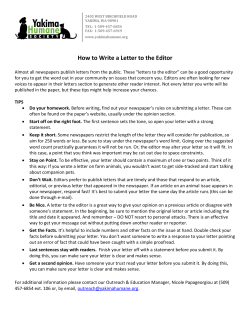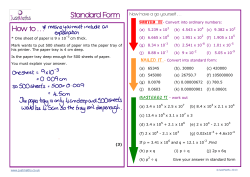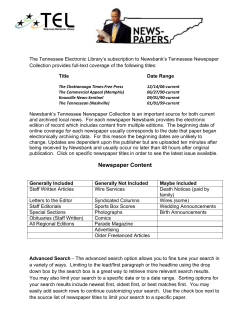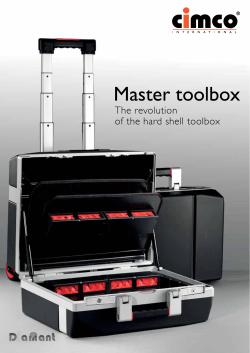
AP Lang. Summer Work â Ms. Howell
2015/2016 AP LANG: Summer Work Ms. Howell askkhowell@gmail.com Rationale As you begin critical reading and writing for this class, you will begin packing a toolbox that will be useful in your future studies and careers. Every activity and assignment is intended to help you pack that toolbox with a new tool so that you can access it first for the AP exam and later for academic and personal success. With that being said, summer work is not intended to be busy work. The reading will keep your mind active, and it will also allow the class to begin smoothly and seamlessly. Once class begins, we will discuss and write about both books. You are to read the following materials: *On Writing: A Memoir of the Craft by Stephen King This is available for free as a PDF: http://biblioteka.teatrobraz.ru/files/file/English_cinema/Stephen_King_On_Writing.pdf *Newspaper article of your choice The Assignment: 20 formative points Have you ever wondered: “Did the author mean to do that?” King’s book provides an excellent response to that question. As King states in the introduction to this book, “What follows is an attempt to put down, briefly and simply, how I came to the craft, what I know about it now, and how it’s done.” In this book, you will learn that writers do indeed make deliberate choices about diction, syntax, details, and other elements as they compose their work. (This analysis is a major component of the work we will do in AP Language.) This book is divided into four sections: C.V., Toolbox, On Writing, and On Living: A Postscript. Your assignments will, likewise, be divided into four sections. For each assignment below, please include the page numbers for the passages discussed. Task #1: C.V. This is a non-fiction text, but it often reads like a novel. To tell his story, King uses literary elements and techniques (i.e. imagery, dialogue, figurative language) which we often associated with fictional pieces. Identify three passages in which King uses such elements/techniques effectively. Explain the elements/techniques he uses and why they are effective. Task #2: Toolbox Create a writer’s toolbox for yourself. Identify 7 rules of writing that King discusses (include page number) which you think are important or interesting. As you select them, think about your own strengths and weaknesses as a writer. Please number your selections 1-7. Then add an additional 7 rules of writing which you have either practiced or been taught throughout your school career. Example: Don’t begin a sentence with “and.” In class, we will discuss the merit of these various “rules.” Task #3 On Writing How does King feel about writing? How do you know? Choose three key passages from this section in which King defines writing, either directly or figuratively. (Remember to include page numbers.) In your own words, restate King’s point about writing in the passage and why you think this point is interesting or important. Task #4: On Living: A Postscript This task does not pertain to just this section of the book. Rather, explain your opinion of King as both a writer and a person. Would you consider reading one of his books now, for example? (If you have read his books prior to this assignment, has your opinion of the author changed? If so, how?) What do you think King’s purpose was in writing this book? Support your answers to both prompts with evidence from the text. Newspaper/Magazine article: 10 formative points Read, clip, and attach one editorial or article from a reputable newspaper or issues-based magazine. Examples of suggested newspapers/magazines/resources: The Globe and Mail (newspaper) The National Post (newspaper) Daily News (local newspaper) The New York Times (newspaper) The Washington Post (newspaper) Atlantic Monthly (magazine) Harper's (magazine) The Economist (magazine) The New Yorker (magazine) Npr.org Writing Assignment – Reflection (1-2 pages): Comment on the aspects of the editorial/ article that you find particularly interesting. Your response should be thoughtful and detailed. Use text to support your commentary. Some questions you might want to think about/comment on: Do you agree or disagree with the article’s viewpoints? Why? Did the article make you want to know more about the issue? What are some of the author's best arguments? Which assertions made by the author do not make sense to you? Why? How does this editorial connect with other knowledge that you have? Summer Work must be typed and turned in on the first day of class!!!
© Copyright 2025













